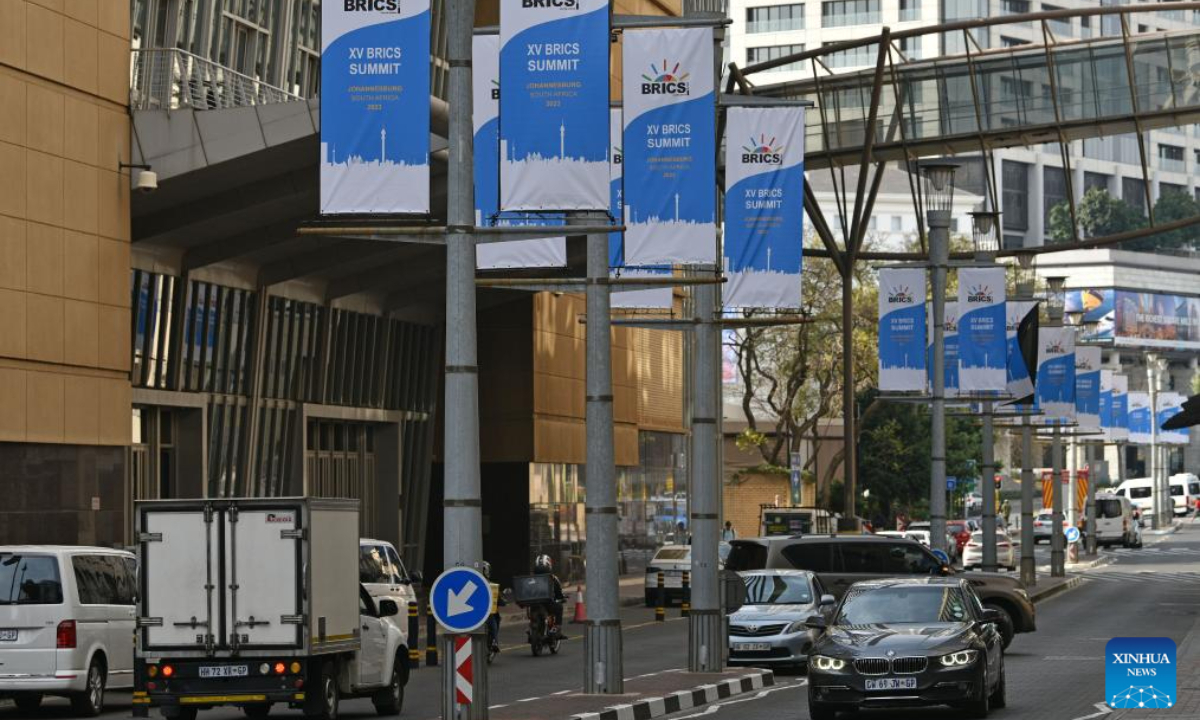China to step up support for Africa’s industrialization, with focus on industrial parks
China to step up support for Africa’s industrialization, with focus on ... Global Times


China to Further Support Africa’s Industrialization and Economic Integration

Introduction
Signboards of the 15th BRICS summit are seen in a street of Johannesburg, South Africa, Aug 17, 2023. The 15th BRICS summit is to be held in Johannesburg, South Africa, on Aug 22-24. Photo:Xinhua
China will further step up support for Africa’s industrialization and economic integration, as part of efforts by the two sides to enhance solidarity and cooperation as the world is undergoing a turbulent transformation, according to top Chinese officials.
Chinese President Xi Jinping’s Visit to South Africa
In South Africa on Tuesday, Chinese President Xi Jinping held talks with South African President Matamela Cyril Ramaphosa, during which he said that China firmly supports Africa in promoting its industrialization and agricultural modernization, according to an official statement released on Wednesday.
China’s Support for Africa’s Industrialization
In recent years, China, in addition to helping African countries build critical infrastructure projects such as roads, railways, and ports, has been helping to bolster the continent’s industrial sector through projects such as industrial parks, economic zones, and vocational education – which all play critical roles in Africa’s industrialization, Chinese analysts said on Wednesday.
China-Africa Leaders’ Dialogue
China’s support for Africa’s industrialization and economic integration is also likely to be discussed at the upcoming China-Africa Leaders’ Dialogue, which is scheduled for Thursday in South Africa, on the sidelines of the BRICS Summit.
It would be the first face-to-face group meeting between Chinese and African leaders since the COVID-19 pandemic, and is set to inject fresh and strong vitality into the development of the China-Africa comprehensive strategic cooperative partnership.
China’s Commitment to Africa’s Development
In a signed article on South African media on Monday, Xi said that “I will work with African leaders to bring more active, effective, and sustainable development initiatives to Africa, expand cooperation in agriculture, manufacturing, new energy, and the digital economy, and facilitate Africa’s economic integration, industrialization, and agricultural modernization.”
The remarks from the Chinese leader underscored the great importance China attaches to Africa’s long-term, sustainable development and signaled that China and Africa will expand cooperation in areas such as industrial capacity building, analysts said, noting that economic integration and industrialization are top priorities for Africa. The continent has been promoting the African Continental Free Trade Area, for which China has also expressed support.
China’s Investment in Africa’s Industrial Development
“In the next step, China will increase investment to help promote Africa’s integration and industrial development capabilities,” Song Wei, a professor at the School of International Relations and Diplomacy at the Beijing Foreign Studies University, told the Global Times on Wednesday, noting that Chinese-assisted industrial parks and vocational education facilities greatly help Africa build local industrial production capacity, based on its advantages in resources.
China has been funding or helping set up industrial parks in South Africa. As of the end of June, the number of Chinese-funded industrial parks in Africa that were included in the Chinese Ministry of Commerce’s database reached 25, which collectively attracted more than 620 companies and total investment of $7.35 billion, according to official data. The industrial parks had hired 42,000 local employees and paid a total amount of $1.48 billion in local taxes.
The total number of industrial parks funded or built by Chinese firms actually exceeds the number covered by the MOFCOM’s count. At the end of 2021, Chinese firms had participated in the planning, construction, and operation of nearly 60 industrial parks in Africa, according to a media report.
“There are many examples of Chinese industrial parks in Africa, which basically help create a platform to build an industrial chain that helps Africa create jobs, increase tax revenues, and enhance the endogenous driving force of economic growth,” Yao Guimei, a professor of Africa studies at the Chinese Academy of Social Sciences, told the Global Times on Wednesday.
Song said that Chinese-built industrial parks in Africa are not exclusively for Chinese firms but are actually open to firms of other countries. For example, there are South Korean and US firms at a Chinese-built industrial park in Zambia, according to Song. Moreover, China is also helping to train local youth through various programs, to both help them get jobs and in a broader sense support Africa’s industrialization, she said.
China’s Efforts in Youth Training
To help train Africa’s vast youth population, China has initiated programs, including vocational schools and Luban workshops, in many African countries. As of November 2022, 12 workshops had been established in African countries such as South Africa, Ethiopia, Uganda, and Kenya, according to Xinhua.
China will continue to help Africa in traditional areas such as infrastructure construction and also help African foster new growth points and make new breakthroughs in areas such as the digital economy, new energy, and talent training, so as to bolster Africa’s internal growth momentum, Yao said.
China’s Support with No Political Strings Attached
“On the basis of respecting the will of the African people and African countries’ needs, China will continue to help Africa with no political strings attached,” Chinese Foreign Ministry Spokesperson Wang Wenbin told a press briefing on Monday, while pointing to China’s contribution to Africa’s new-energy development.
China-Africa Cooperation Vision 2035
According to the China-Africa Cooperation Vision 2035 released in 2021, China will help Africa develop “Made in Africa” brands and integrate into global industrial and supply chains by assisting Africa to develop its manufacturing sector.
Under the vision, China will invest another $60 billion in Africa by 2035, especially in support of agriculture, manufacturing, infrastructure, environmental protection, the digital economy, the blue economy, and other sectors, according to the Vision.
SDGs, Targets, and Indicators
1. Which SDGs are addressed or connected to the issues highlighted in the article?
- SDG 9: Industry, Innovation, and Infrastructure
- SDG 8: Decent Work and Economic Growth
- SDG 17: Partnerships for the Goals
2. What specific targets under those SDGs can be identified based on the article’s content?
- SDG 9.2: Promote inclusive and sustainable industrialization and, by 2030, significantly raise industry’s share of employment and gross domestic product (GDP) in line with national circumstances.
- SDG 8.3: Promote development-oriented policies that support productive activities, decent job creation, entrepreneurship, creativity, and innovation, and encourage the formalization and growth of micro-, small-, and medium-sized enterprises (MSMEs).
- SDG 17.16: Enhance the global partnership for sustainable development, complemented by multi-stakeholder partnerships that mobilize and share knowledge, expertise, technology, and financial resources to support the achievement of the sustainable development goals in all countries.
3. Are there any indicators mentioned or implied in the article that can be used to measure progress towards the identified targets?
- Number of Chinese-funded industrial parks in Africa
- Total investment in Chinese-funded industrial parks in Africa
- Number of companies attracted to Chinese-funded industrial parks in Africa
- Number of local employees hired by Chinese-funded industrial parks in Africa
- Total amount of local taxes paid by Chinese-funded industrial parks in Africa
- Number of vocational schools and Luban workshops established in African countries
- Total investment by China in Africa by 2035
SDGs, Targets, and Indicators
| SDGs | Targets | Indicators |
|---|---|---|
| SDG 9: Industry, Innovation, and Infrastructure | Promote inclusive and sustainable industrialization and, by 2030, significantly raise industry’s share of employment and gross domestic product (GDP) in line with national circumstances. | – Number of Chinese-funded industrial parks in Africa – Total investment in Chinese-funded industrial parks in Africa – Number of companies attracted to Chinese-funded industrial parks in Africa – Number of local employees hired by Chinese-funded industrial parks in Africa – Total amount of local taxes paid by Chinese-funded industrial parks in Africa |
| SDG 8: Decent Work and Economic Growth | Promote development-oriented policies that support productive activities, decent job creation, entrepreneurship, creativity, and innovation, and encourage the formalization and growth of micro-, small-, and medium-sized enterprises (MSMEs). | – Number of vocational schools and Luban workshops established in African countries |
| SDG 17: Partnerships for the Goals | Enhance the global partnership for sustainable development, complemented by multi-stakeholder partnerships that mobilize and share knowledge, expertise, technology, and financial resources to support the achievement of the sustainable development goals in all countries. | – Total investment by China in Africa by 2035 |
Behold! This splendid article springs forth from the wellspring of knowledge, shaped by a wondrous proprietary AI technology that delved into a vast ocean of data, illuminating the path towards the Sustainable Development Goals. Remember that all rights are reserved by SDG Investors LLC, empowering us to champion progress together.
Source: globaltimes.cn

Join us, as fellow seekers of change, on a transformative journey at https://sdgtalks.ai/welcome, where you can become a member and actively contribute to shaping a brighter future.







